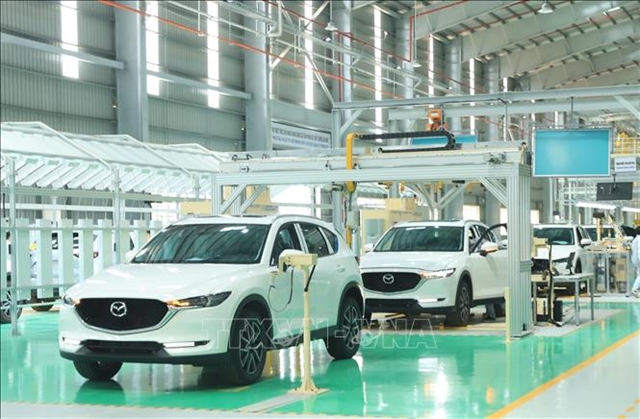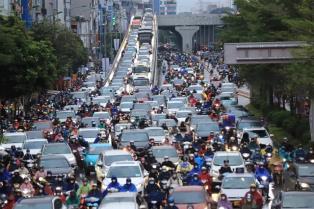The 50 per cent reduction of registration fee for domestically-assembled cars is considered a push to help the auto market grow in the next six months.

A 50 per cent reduction in registration fees for domestically-assembled cars is forming part of a push to help the auto market grow in the next six months.
Deputy Prime Minister Le Minh Khai signed Decree No 103/2021/ND-CP of the Government stipulating the registration fee for cars, trailers, or semi-trailers pulled by cars and similar vehicles manufactured and assembled domestically.
The decree clearly states that the registration fee rate for domestically manufactured and assembled cars will be 50 per cent compared to the previous one, applicable from December 1 to the end of May 31 next year.
Experts said that the Government's agreement to reduce the registration fee tax by 50 per cent for a period of six months for domestically-assembled cars would be a great motivation to promote domestic automobile production and assembly.
The fee reduction will also restrict imported cars and stimulate consumer shopping needs, which are impacted negatively by the COVID-19 pandemic.
Not only that, the policy is also expected to increase budget revenue from this important industry.
As proof of this, when the Government reduced the registration fee by 50 per cent in the second half of last year, the out-the-door price decreased from VND14.95 million (US$650) to VND298 million, helping to double the number of newly registered cars.
Therefore, although the registration fee revenue decreased by VND7.3 trillion, the total state budget revenue nearly doubled to VND14.1 trillion.
Economic expert Ngo Tri Long said that authorities who want to have a source of income must nurture and generate revenue because in the context of the COVID-19 pandemic, as if prices and fees were high, people would not have money to buy.
Therefore, the 50 per cent reduction in car registration fees will stimulate consumer demand, thereby promoting production and circulation of goods, restoring growth momentum and earning a return.
An expert in the automobile industry said that the reduction was a good opportunity for consumers to shop after the pandemic and an opportunity for businesses to release inventory vehicles.
At the same time, it also allows businesses to produce again after being affected by the pandemic, which caused many factories to close because of social distancing.
However, some experts said that the reduction value was only significant for customers who buy luxury cars that cost billions of dong.
Meanwhile, the majority of Vietnamese consumers buy cars priced around VND500 million, so the reduction is only VND30 million or less, equivalent to promotions that have been applied by companies previously. When the reduction was applied last year, many car manufacturers and dealers immediately cut promotions applied to customers to offset business costs.
In the face of negative impacts from the pandemic, people are tightening their spending, and being supported with 50 per cent of registration fees will have a great impact on purchasing power in the auto market.
It is forecast that the auto market in the last two months of this year and the first four months of next year will grow strongly, focusing on domestically produced and assembled vehicles.
The Viet Nam Automobile Manufacturers Association (VAMA) said that sales of the entire market of VAMA members reached 29,797 vehicles of all types in October, a month-on-month increase of 120 per cent.
In terms of vehicle origin, while the sales of domestically-assembled cars reached 15,344, up 110 per cent, sales of CBU cars were 14,453, up 132 per cent over the previous month.
In general, VAMA sales reached 218,734 vehicles of all kinds in the first 10 months of this year, up 3 per cent over the same period last year.
In terms of vehicle origin, while sales of domestically-assembled cars declined by 9 per cent, imported CBU cars grew by 24 per cent over the same period as last year. — VNS





